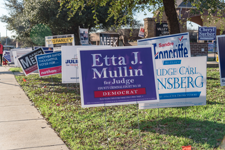
Part I: Can HOAs restrict homeowners’ speech?
For individuals residing in common interest developments, the constitutional right to free speech is not applicable. While many believe that they have a right to freely express themselves by posting signs, banners, flags, and religious symbols on their own properties, they may be surprised to learn that their HOAs and condominium associations are not bound by the free speech clauses contained within the federal and state constitutions. Though, in California, this does not mean that residents automatically lose their free speech rights when they move into their associations, because the Davis-Stirling Act safeguards many of the same rights that are enjoyed by citizens residing outside of common interest developments.
Constitutional Rights to Free Speech
Both the state and federal constitutions prohibit state actors (i.e., the government) from restricting free speech, but these constitutional protections do not generally apply to purely private actors, like HOAs and condominium associations. Throughout the years, numerous exceptions to this general rule have been made. In Marsh v. Alabama (1946) 326 U.S. 501, the United States Supreme Court held that a “company town,” even though privately organized, provided many services typically reserved to a city; therefore, the private town was bound to abide by the First Amendment. The California Supreme Court has gone even further to hold that the state constitution affords broader protections than the U.S. Constitution by protecting free speech rights on privately owned property when such property is freely and openly accessible to the public. (Golden Gateway Center v. Golden Gateway Tenants Association [2001] 26 Cal.4th 1013.) Despite these rulings, most common interest developments will continue to be viewed private actors that are not subject to the same constitutional restraints as the government, because they are private organizations that are not freely and openly accessible to the public.
Statutory Free Speech Safeguards
Regardless of whether the federal and state constitutional protections apply, the California legislature has enacted various statutes that prevent common interest developments from infringing on the free speech rights of their members. These state protections are consistent with our country’s “special respect for individual liberty in the home [which] has long been a part of this Nation’s culture and law…” (City of Ladue v. Gilleo [1994] 512 U.S. 43, 44.). These statutes vary depending on the type of speech at-issue:
(i) noncommercial speech;
(ii) commercial speech;
(iii) religious symbols;
(iv) display of U.S. flags;
(v) speech/assembly rights pertaining to HOA elections, public elections, legislation and/or living with HOAs
As such, the first step in analyzing whether an association may restrict and/or ban homeowners’ speech is to identify the category of speech involved. This is because different types of speech deserve different levels of protection under the law. We will discuss each category of speech (i.e. commercial, non-commercial, religious symbols, flags, etc.) and the associated protections, in more depth, in our blog articles to follow.
| Before banning and/or restricting an individual from speaking, homeowners associations should always consult with their HOA attorney to ensure compliance with the pertinent laws. |
 HOA Lawyer Blog
HOA Lawyer Blog

